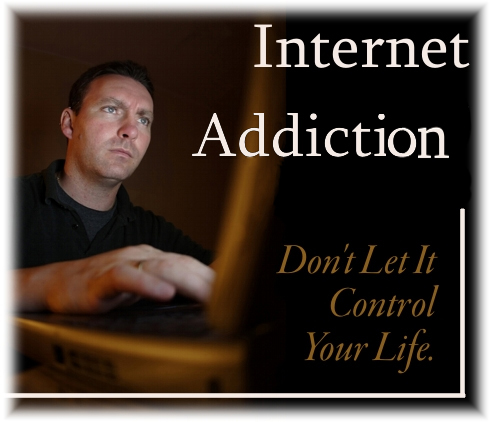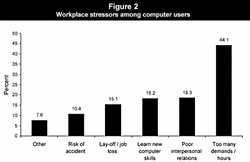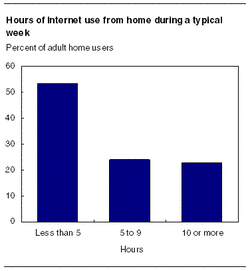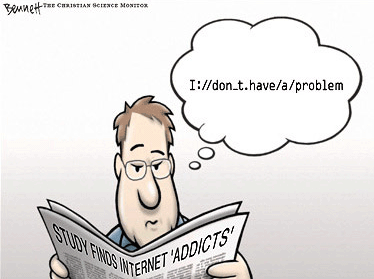Do you suffer from cybershakes?
Contents
Group Name
Cybershakers
Group Members
- Amber Lick
- Joel Carlson
- Christine Keck
Project Statement
The purpose of this project is to educate the reader on the prominent problem of Internet addiction and how it is quickly being brought to the attention of researchers, psychologists and scholars as a legitimate disorder requiring medical/psychological attention. To do this we will give a brief history on Internet Addiction Disorder (IAD), we will describe the symptoms that go along with the disorder as well as a few examples of people who have suffered from a severe case of the addiction. We will also be examining some recent studies done on the subject as well as some recovery techniques that have been discovered. This project was conducted through secondary research and all information that was used is referenced below.
Argument
In todays society everyday citizens are extremely dependent on computers and the Internet for essentially everything they do. The Internet has grown into an incredible tool, with options for people of all walks of life. It has become extremely easy to shop from home, research any subject, and the Internet is a convenient place to spend your leisure time. The amount of things the Internet can be used for now is staggering, and people are taking full advantage of it, use of the Internet has skyrocketed in the past few years as it has become a central part of our society. Unfortunately for some users, the lure of the Internet has become too enticing and they have fallen into what many psychologists are calling a serious addiction.
Introduction
Internet Addiction Disorder (IAD) was first recognized by Ivan Goldberg, M.D. It is described as an impulse-control disorder which does not involve an intoxicant. It is a compulsive behaviour that disrupts the every-day life. The addict’s life is dominated by the Internet and they would be willing to sacrifice and prioritize the Internet over their family, friends and work. (FAQ)
Goldberg explained that it is "a maladaptive pattern of Internet use, leading to clinically significant impairment or distress as manifested by the following: The use of Computers takes up so much time as to cause: discomfort and/or decreased occupational, academic, social, work-related, family-related, financial, psychological, or physiological functioning.” (Suler, J)
It originated when Goldberg, who is a psychiatrist, posted in 1996, as a joke, symptoms for pathological computer use. Goldberg, to his surprise, received many comments from people who related to these symptoms who were seeking help. In 1998, Dr. Kimberly Young published a book called Caught in the Net: How to Recognize the Signs of Internet Addiction and a Winning Strategy for Recovery.
It is now estimated that five to ten percent of the population suffer from this disorder. Types of the addiction include online affairs, online gambling, eBay addiction, compulsive surfing and gaming. Men and women are both susceptible to this condition.(FAQ) Dr. Young is concerned that the growing use of the Internet on campus could also increase the chance of developing an addiction. She believes that the unlimited Internet access, unstructured time schedule, the new freedom from parents, no monitoring, and encouragement from the schools all contribute to this growing problem. (Young, Surfing)
Although "Internet Addiction Disorder" is not yet in the Diagnostic and Statistical Manual of Mental Disorders (DSM IV), there have been many recent studies done to suggest that this is a legitimate disorder. Many professionals are working on finding a treatment.
CBS News: Katie Couric: Notebook: Internet Addiction, May 2007 http://www.youtube.com/watch?v=fYxPXKuvPZ0
Symptoms
• Preoccupation with the Internet (thinking about the Internet while offline)
• Loss of control (unable to leave computer)
• Feel restless, irritable and moody while offline ("cybershakes")
• Distraction and withdrawal from usual activities (using the Internet as a way of escaping and avoiding reality)
• Dishonesty in regard to Internet use (how much time spent online, what they are doing online)
• Creation of virtual intimate relationships with other Internet users
• Loss of a significant relationship due to Internet use
• Lack of sleep
(Young, Surfing)&(Young, Internet)
What Makes the Internet so Addictive?
Internet addiction is commonly divided into different activities on the Internet. These categories are things like addiction to social networking, gaming, shopping, gambling and even blogging. In 1999 Dr. David Greenfield of Virtual-Addiction.comconducted a study which claimed that up to 6% of users will experience "significant impact on their lives" from their Internet abuse, he went on to emphasize that "gaming, gambling, and shopping online can produce mood-altering effects".
Addiction can easily be defined using a set of a symptom criteria.
- Salience: the activity or drug becomes the most important activity in a person's life
- Mood modification: feeling a buzz or high, or feeling numb or tranquil.
- Tolerance: Increasing amounts of the substance or activity are needed over time to produce the same euphoric effect.
- Withdrawal symptoms: unpleasant feeling states which occur when the substance or activity is removed.
- Conflict: Interpersonal conflict because of the substance or activity, and intrapersonal conflict within the individual.
- Relapse: the tendency to repeatedly revert to earlier pathological patterns of use, and for the most extreme patterns of use to be quickly restored after many years of control or abstinence. (Griffiths)
The Centre for Internet Addiction Recovery, a website run by Dr.Kimberly Young devoted to gaining recognition for Internet addiction, and helping those who believe they are addicted states that "Internet addicts suffer from emotional problems such as depression and anxiety-related disorders and often use the fantasy world of the Internet to psychologically escape unpleasant feelings or stressful situations". Much like other addictions much of the problem is based on the users personality, someone with an "addictive personality" will be the most susceptible to becoming addicted. A study on the personality traits associated with Internet addiction showed that individuals with "highly developed abstract thinking skills" were likely to be attracted by the vast amounts of information available on the web. Introversion, and individuals preferring a more solitary life are also traits common to the addicted population.
The anonymity of the Internet is a large draw for many, creating an online persona is an extremely common thing for users. The limited ability of other users to determine the actual identity of someone they are chatting, or playing a game with, makes it extremely easy to be someone you are not on the Internet. Introverted individuals may use various outlets on the Internet such as social networking sites, or interactive forums as their only means of expressing themselves, and this leads to saliency, a central tenet of addiction. http://www.netaddiction.com/articles/personality_correlates.pdf
Statistics
There are few statistics directly concerning the Internet Addiction Disorder as it is a relatively new concept. However there are many statistics showing just how much the internet is involved in our every day lives. These statistics are from Statistics Canada in 2005. We can assume that the use of internet and technology has increase since then.
• 2/3 of Canadian adults over the age of 18 use the Internet.
• Calgary and Ottawa have the highest percentage of adults using the Internet at 77%.
• 79% of individuals under 25 use the Internet for educational purposes.
• Over half the population uses the Internet for banking and paying bills online. (Statistics Canada)
One of the largest studies done on this topic was by Dr. Dave Greenfield. In 1998 he surveyed 18,000 Internet users.
• 5.7% of the sample met the criteria for compulsive Internet use.
• 75% of those who met the criteria said they met someone online who they had feelings of intimacy for.
• 62% of those who met the criteria said they visited pornography sites regularly. (DeAngelis)
An unpublished study done by Keith Anderson, PhD, who sampled 1,300 college students and found that:
• 7.9% met the criteria of Internet dependence.
• 88% of those students were male. (DeAngelis)
Examples
Internet addiction is not a difficult thing to see all around. Social networking sites like Facebook, or Myspace have massive user databases, and many users abuse the sites to the point that anyone would call it an addiction. An addiction to a site like Facebook is relatively harmless for most, but some spend hours upon hours poring over other people photos to the point that it affects their lives. Unfortunately this is not as serious as Internet addiction can get.
A study comparing Internet addicts with other addicts by British psychologist, Mark Griffiths, found multiple case studies all thought to be truly addicted to the Internet. A 15 year old boy who spends all his time on his computer, excluding his family and friends from his life. A 16 year old student who spends upwards of 40 hours a week online, A 35 year old unemployed Canadian female who spends 40 hours per week on IRC chat rooms, and many more. The study found that these people were legitimately addicted to the Internet, and their use was negatively affecting their lives.
Severe Internet addiction has even caused multiple deaths. Notably, in 2005, a South Korean man who died of heart failure caused by lack of sleep and an improper diet in the time leading up to his death. The 28 year old man had been playing an Internet game for nearly 50 hours straight when he collapsed. He was quickly transported to the nearest hospital, but passed away shortly after.
In 2007 a 30 year old Chinese man passed away in an internet cafe after a 3 day long Internet binge. His death is believed to have been caused by exhaustion. As a direct result of this mans death, Chinese officials banned the opening of new Internet cafes in all of China in an attempt to crack down on Internet addiction.
This is not the first time the Chinese government has taken action against Internet cafes. In 2004 they shut down nearly 8600 unlicensed Internet cafes after two teens fell asleep on railroad tracks and were run over following a 48 hour Internet binge.
Studies
There have been many studies done in the past few years on Internet addiction and the consequences of it. A few studies are listed here.
Stanford University Study
In 2006, Stanford University School of Medicine researchers did a study to see if spending too much time online could be classified as an addiction or simply a bad habit. They wanted to see if there was evidence enough for a medical diagnosis. Their preliminary research showed that one in eight Americans had sings of problematic Internet use. They also discovered that "the typical affected individual is a single, college-educated, white male in his 30s". They found out that some many people were spending as much as thirty hours of non work related time online. The researchers said that it creates a real problem for some people and that many are even starting to see their doctors for help. Many people are starting to see IAD as a legitimate medical condition and even an economic problem because of the time being spent online while at work. This study did not prove that IAD is a diagnosis but it did lay the groundwork for more studies to dig deeper into the rising problem. "The researchers found that 68.9 percent were regular Internet users, which is consistent with previous studies, and that:
-13.7 percent (more than one out of eight respondents) found it hard to stay away from the Internet for several days at a time
-12.4 percent stayed online longer than intended very often or often
-12.3 percent had seen a need to cut back on Internet use at some point
-8.7 percent attempted to conceal nonessential Internet use from family, friends and employers
-8.2 percent used the Internet as a way to escape problems or relieve negative mood
-5.9 percent felt their relationships suffered because of excessive Internet use." (Brandt, 2006)
Italian Chat Room Study
In 2007 there was an Italian study conducted and published on Italian chat room users. The study concluded that young users and night users are more at risk of developing Internet addiction. The researchers attributed this to the fact that young people are attracted to information and communication technologies. They also found out that employed users are more at risk for developing IAD than unemployed users. "They perceive their social and individual quality of life as more compromised then unemployed." The study showed that the Internet seems to become a 'mental refuge' for these people. (Ferraro, 2007)
Paidon Clinic Study
In another study done by medics in the Paidon clinic in Athens, Greece a sample of 1,021 15-year-olds was taken. In this study they discovered that 20% of adolescents are dangerously close to becoming seriously addicted. They found that of their sample population, already 1% (approximately 10 kids) needed clinical treatment.
Related Disorders
Nathan Shapira of the University of Cincinnati College of Medicine conducted a study in 1998. The conclusions he drew centered around the fact that addiction to the Internet seemed to come along with other psychiatric disorders. He believes that treating the other conditions may help the Internet addiction to subside. His study was conducted on fourteen people whose lives had been interrupted by the addiction, such as one 21-year-old college student who had dropped out of school. He disappeared and was found a week later after spending seven days online in one of the university computer labs. Shapira saw the addiction as a form of impulse control not unlike compulsive shopping. Many of the people in his study had a history of manic depression, anxiety disorders, eating disorders, other impulse control disorders and substance abuse or a combination of a few at some point in their lives. Kimberly Young, an expert psychologist on Internet addiction, commented that she had also seen this but said that many people who had no prior psychiatric problems were also hooked. (1998)
Internet Addiction Recovery
Many researchers and scholars of Internet addiction believe that it has to be treated like any other extreme and menacing addiction. Medication such as Seretonin blockers and Naltrexone are often prescribed to victims of this addiction. Ironically, the most common form of recovery from Internet addiction are online recovery centers, such as the Centre for Internet Addiction. These online centers offer assessments and help in many different areas such as cybersex/cyberporn, online affairs, online gambling and ebay addiction. All of these Internet addictions have different recovery techniques.
Recovery Techniques
- Cybersex/cyberporn: Has in person, telephone and online counseling, the counsellors utilize specialized recovery techniques which will be described below. The counselors try to deal with the underlying issue and often partner and couples counseling is needed.
- Online Affairs: The individual needs help understanding the rationalizations and underlying problems they are dealing with through professional counseling.
- Online gambling: This particular addiction also requires counseling. Online behaviour management, financial management and family therapy are other popular techniques. There is also a twelve step recovery program designed to help victims of addiction gambling.
- Ebay Addiction: Often people addicted to ebay have self esteem issues that need to be addressed. They get addicted to ebay because winning makes them feel important. So counselors help them to redirect their energy into healthier outlets.
Counseling Strategies
Dr. Kim Young works for the Centre for Internet Addiction and has much experience in working with victims of the addiction. She has written many books and has developed a few net addiction treatment strategies that people have found to be effective. They are listed below:
- Practice the Opposite: People with the addiction are encouraged to develop new schedules in order to disrupt their normal routine. In turn, this should have an effect on how much time they spend on the Internet.
- External Stoppers: Counsellors tell their patients to set alarms for the time they need to log off. This way they have an external thing letting them know when the time is up.
- Setting Goals: In order to have a sense of control over the time they spend on the Internet, patients are encouraged to schedule their time on the Internet into specific time slots. They then write these times on a calendar. The sessions should be brief but frequent in order to avoid cravings or withdrawal.
- Abstinence: This treatment is most applicable for patients with prior addictions. They are required to stay away from the application they are addicted to altogether. For example, if the addiction is to chat rooms, they can still use the Internet to do research and send emails, etc. but they are required to stay away from all chat rooms.
- Reminder Cards: This technique requires patients to make a list of five major problems caused by the addiction and five major benefits of cutting down or abstaining from the addiction. They then transfer the list to index cards and keep the cards with them.
- Personal Inventory: Victim makes a list of every activity that he/she has missed out on or has stopped doing because of the Internet. They then reflect on how their life was better when these said activities were present.
- Support Groups: Like many other addictions, Internet addiction has support groups people can join in order to meet people who are in the same or similar situations. Patients are also encouraged to join any kind of group outside of the Internet in order to meet new people. This is due to the fact that many Internet addicts are people who live the "lonely lifestyle".
- Family Therapy: This is necessary for people who's family lives have changed or been disrupted by Internet Addiction Disorder. It is designed to educate the family on the addiction, to reduce the blame on the individual addicted, to improve communication within the family about what drove the person to addiction in the first place, and to encourage the family to help with the recovery process.
As Internet addiction is becoming prominent all across the world, other countries are coming up with alternate solutions. In South Korea, for example, 140 "tough love" rehabilitation centres were constructed in order to help people with IAD. In China an Internet addiction treatment centre opened that uses a blend of therapy and military drills for children with the disorder. IAD is such a new problem that the treatment and recovery process are changing daily. It is beginning to be taken more seriously by professionals and governments and the necessary treatments are being discovered.
References
Amber
"Articles on Internet Addiction" Center for Internet Addiction Recovery. 2006. Retrieved February 2008 from <http://www.netaddiction.com/articles/articles.htm>
"Frequently Asked Questions" Center for Internet Addiction Recovery. 2006. Retrieved February 2008 from <http://www.netaddiction.com/faq.htm>
"Ivan Goldberg Discusses "Internet Addiction"". New Yorker Magazine. January 13,1997. Retrieved February 2008 from <http://www.psycom.net/iasg.html>
"Symptoms - Internet Addiction". MentalHelp. April 16,2004. Retrieved February 2008 from <http://www.mentalhelp.net/poc/view_doc.php?type=doc&id=3831&cn=66>
DeAngelis, Tori. "Is Internet Addiction Real?". Monitor on Psychology. Volume 31, No.4. April 2000. Retrieved March 2008 from <http://www.apa.org/monitor/apr00/addiction.html>
Goldberg,Ivan. "Information about Ivan Goldberg, MD". Psycom. Retrieved February 2008 from <http://psycom.net/ikg8.html>
Grohol, John M. "Internet Addiction Guide" PsychCentral. Revised April 16, 2005. Retrieved February 2008 from <http://psychcentral.com/netaddiction/>
Grohol, John M. "Internet Addiction Quiz" PsychCentral. Revised May 23, 2006. Retrieved February 2008 from <http://psychcentral.com/netaddiction/quiz/>
Statistics Canada. "Canadian Internet Use Survey". The Daily. August 15, 2006. Retrieved March 2008 from <http://www.statcan.ca/Daily/English/060815/d060815b.htm>
Suler, John. "Computer and Cyberspace Addiction" International Journal of Applied Psychoanalytic Studies. Volume 1. Pages 359-362. 2004. Retrieved February 2008 from <http://www-usr.rider.edu/~suler/psycyber/cybaddict.html>
Suler, John. “Is there truth in jest?”. The Psychology of Cyberspace. Revised March 1998. Retrieved February 2008 from <http://www-usr.rider.edu/~suler/psycyber/supportgp.html>
Webb, Nichola. "Hooked on the Internet? Internet Addiction - a Growing Phenomenon on University Campuses". Edith Cowan University. 2007. Retrieved February 2008 from <http://www.ecu.edu.au/student/data/shared/documents/internet_addiction.doc>
Young, Kimberly. "Internet Addiction: Symptoms, Evaluation, And Treatment". Center for Online Addiction. Retrieved February 2008 from <http://www.netaddiction.com/articles/symptoms.htm#TITLE>
Young, Kimberly. "Surfing not Studying: Dealing with Internet Addiction on Campus". Center for Online Addiction. Retrieved February 2008 from <http://www.netaddiction.com/articles/surfing_not_studying.pdf>
Christine
Brandt, Michelle L. "Internet Addiction: Too Much of a Good Thing." October 18, 2006. Retrieved February 27, 2008 from http://news-service.stanford.edu/news/2006/october18/med-internet-101806.html
Center for Internet Addiction. 2006. Retrieved February 27, 2008 from http://www.netaddiction.com/
Conrad, Brent. "Computer, Gaming & Internet Addiction Treatment Services". March 30, 2008. Retrieved April 2, 2008 from http://www.techaddiction.ca/home/index.html
Dixon, Guy. "Korean cyber-addicts sent to boot camp". November 22, 2007. Retrieved April 2, 2008 from http://www.vnunet.com/vnunet/news/2204021/korean-cyber-addicts-bootcamp
Ferraro, G., Caci, et al. "Internet Addiction Disorder: An Italian Study." <CyberPhyscology & Behavior>. Vol. 10. 2007. Retrieved February 27, 2008 from http://www.liebertonline.com/doi/pdf/10.1089/cpb.2006.9972?cookieSet=1
Juan, Dr. Stephen. "Could you be addicted to the Internet?" September 22, 2006. Retrieved April 2, 2008 from http://www.theregister.co.uk/2006/09/22/the_odd_body_internet_addiction/
Kirkly, Sharon. "Recognizing Internet addiction as a mental illness, MD urges". March 17,2008. Retrieved April 2, 2008 from http://www.canada.com/ottawacitizen/story.html?id=705d2e4e-420f-4555-82ac-285b73d74d96&k=37204
"Psychological and emotional impact of teens personal life for internet addiction." 2006. Retrieved February 27, 2008 from http://www.ndri.com/article/psychological_and_emotional_impact_of_teens_personal_life_for_internet_addiction-463.html
ScienceDaily. "What Exactly is 'Internet Addiction' and What is the Treatment?" August 18, 2007. Retrieved February 27, 2008 from http://www.sciencedaily.com/releases/2007/08/070817130113.htm
"Study: Internet 'addicts' often show other disorders." May 31, 1998. Retrieved February 27, 2008 from http://www.cnn.com/HEALTH/9805/31/internet.addiction/
Thompson, Steven John. "Internet Connectivity: Addiction and Dependency Study." 1997. Retrieved February 27, 2008 from http://mediainformatics.biz/iads/
Joel
About.com, "What is "Normal" Internet use?", March 12, 2006. Retrieved March, 2008 from
<http://mentalhealth.about.com/cs/sexaddict/a/normalinet.htm>
About.com, "Pathological Internet Use", November 21, 2003. Retrieved March, 2008 from
<http://mentalhealth.about.com/cs/sexaddict/a/intaddict.htm>
BBC News, "S Korean dies after games session", August 10, 2005. Retrieved February, 2008 from
<http://news.bbc.co.uk/1/hi/technology/4137782.stm>
CBC News, "China bans new internet cafes for a year", March 6, 2007. Retrieved February, 2008 from
<http://www.cbc.ca/news/story/2007/03/06/tech-china-cafe.html>
Childnet, "Internet Addiction", 2006. Retrieved April 2008 from
<http://www.childnet-int.org/downloads/factsheet_addiction.pdf>
Curezone.com, "What is Internet & Web Addiction?". Retrieved March, 2008 from
<http://curezone.com/faq/q.asp?a=1,42&q=238>
Jason Morrison, "Searching for Internet Addiction". April 24, 2000. Retrieved April 2008 from
<http://www.jasonmorrison.net/car.html>
Mark Schliebs, "Net Addicts Mentally Ill, Top Psychiatrist says". March 19, 2008. Retrieved April 2008 from
<http://www.news.com.au/technology/story/0,25642,23402395-5014108,00.html>
Mindprison, "Internet Addiction Disorder" 2007. Retrieved February, 2008 from
<http://library.thinkquest.org/06aug/02049/text_el/treatments_prev.htm>
Reuters, "Man in China dies after three-day Internet session" Sept. 17, 2007, Retrieved February, 2008 from



